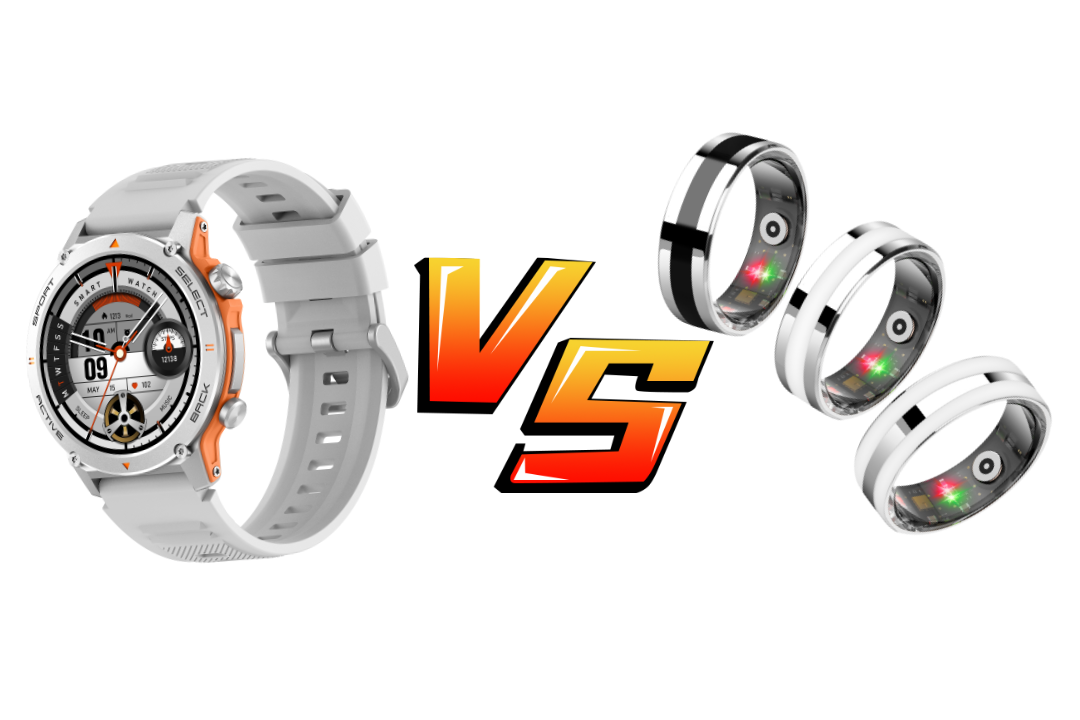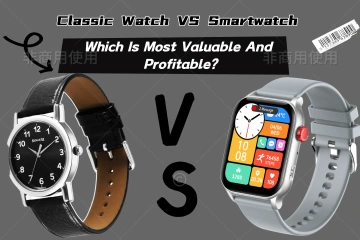Smartwatch VS Smart Ring: A Comprehensive Comparison For Tech-Savvy Users
Smart wearables have evolved significantly, enhancing our lives with easy-to-access health data, notifications, and convenience. The most popular wearables are "smart watches" and the newer entrant, ”smart rings” Both serve the same goal of tracking health metrics and making life more convenient but they differ in many ways, such as design, functionality, and user preference. This article delves into a thorough comparison of smartwatches vs. smart rings, helping you decide which one suits your needs.
- Introduction
- Design and Aesthetics
- Key Features
- Battery Life and Charging
- Durability and Build Quality
- Accuracy of Tracking
- Compatibility with Devices
- Ease of Use
- Privacy and Data Security
- Price Comparison
- Use Cases and Target Audience
- Future of Wearable Technology
- Environmental Impact
- Popular Brands and Models
- FAQs
- Conclusion

Introduction
Wearables like smartwatches and smart rings have become integral to monitoring our health, staying connected, and even enhancing productivity. Both offer significant functionality, but choosing between them often depends on personal preferences, lifestyle, and specific features you prioritize.
- What Are Smart Watches?
Smartwatches have been around longer and are wrist-worn devices that can track various health metrics, including heart rate, steps, calories burned, and sleep patterns. Many also integrate with your smartphone, offering features like notifications, GPS, and music playback. Brands like Apple, Samsung, and Garmin dominate the market.
- What Are Smart Rings?
Smart rings, on the other hand, are newer and less common but provide a sleek and minimalist approach to wearables. These small, finger-worn devices focus on health tracking, offering heart rate monitoring, sleep analysis, and even oxygen saturation tracking. Despite their size, they pack a punch in functionality. Brands like Oura and Motiv are leading the charge in this category.
Design and Aesthetics
1. Size and Form Factor: A significant difference between smartwatches and smart rings is their form factor. Being larger, smartwatches provide more screen real estate, making interacting with the device easier. Conversely, smart rings are much smaller and almost unnoticeable on the hand, offering a minimalist look.
2. Fashion and Style: Smart rings might be more appealing for those who prioritize fashion due to their subtle design. They can blend seamlessly with your everyday jewelry without drawing much attention. On the other hand, smartwatches are bulkier but can be dressed up with various bands and watch faces to suit personal style.
3. Comfort: Smart rings are typically lighter and less intrusive, making them more comfortable to wear throughout the day and even while sleeping. Smartwatches, however, may become cumbersome for some users, especially during exercise or sleep, due to their size and weight.

Key Features
- Health and Fitness Tracking
Both smartwatches and smart rings excel at health tracking, but they do so differently. Smartwatches often provide more detailed metrics, including advanced data on activities like running, cycling, or swimming. They can also integrate GPS for outdoor workouts. Smart rings focus more on core health metrics such as heart rate variability (HRV), sleep stages, and sometimes blood oxygen levels. While they may lack some of the advanced workout modes found in smartwatches, they are often more focused on holistic wellness.
- Notifications and Communication
Smartwatches have the edge here. With their larger display, they allow users to view and respond to notifications, messages, and calls. Some smartwatches even offer voice commands and built-in microphones, allowing for hands-free communication. Smart rings, due to their size, lack these features. While some may vibrate to notify you of calls or messages, they don't offer the same level of interaction or communication options.
- Sleep Monitoring
Both smartwatches and smart rings offer sleep tracking, but smart rings are often more comfortable to wear overnight due to their smaller size. Rings like the Oura Ring specialize in tracking sleep stages and offering deep insights into sleep quality, recovery, and readiness for the day.

Battery Life and Charging
- Smart Watch Battery Life
Most smartwatches need to be charged daily or every other day, depending on usage. Devices with high-resolution screens, GPS, and constant notifications consume battery quickly, necessitating frequent charging.
- Smart Ring Battery Life
Smart rings generally offer a longer battery life, often lasting between 3 to 7 days, depending on the model. This is because they have fewer features and no display, resulting in lower energy consumption.
- Charging Methods
Smartwatches are typically charged via a proprietary charging dock or cable. Smart rings, due to their smaller size, often use compact charging cases, making them easier to charge on the go.

Durability and Build Quality
- Material and Build Quality
Smartwatches are often made from materials like aluminum, stainless steel, or ceramic, and some are designed to be scratch-resistant. Smart rings are generally crafted from durable materials like titanium or ceramic, providing a sleek yet tough exterior.
- Water Resistance and Durability
Most smartwatches and smart rings are water-resistant, though smartwatches typically offer more robust resistance suitable for swimming or diving. Smart rings, while water-resistant, are often not built for intense water activities like deep diving.

Accuracy of Tracking
- Health Data Accuracy
Smartwatches usually offer more detailed data thanks to their larger size, allowing for more sensors. However, smart rings provide comparable accuracy for metrics like heart rate, HRV, and sleep quality, though they may lack the advanced features found in high-end smartwatches.
- Fitness Tracking Accuracy
Smart watches generally excel in fitness tracking, offering detailed workout data, GPS tracking, and heart rate monitoring. While smart rings can track basic fitness activities like steps and calories, they don’t offer the same range of workout options or performance analysis.
- Sleep Monitoring Accuracy
Many users find that smart rings provide more accurate and comprehensive sleep tracking than smartwatches, as they are more comfortable to wear overnight and focus on specific sleep-related metrics.

Compatibility with Devices
- Operating System Compatibility
Smartwatches like the Apple Watch are often tied to specific ecosystems (i.e., iOS), while others like Samsung and Garmin support both iOS and Android. Smart rings tend to offer broader compatibility across multiple platforms, making them versatile for any user.
- App Ecosystem Integration
Smartwatches boast larger app ecosystems, enabling access to various third-party apps for fitness, productivity, and communication. Smart rings, however, are more limited, generally syncing with a handful of apps dedicated to health tracking.

Ease of Use
- User Interface
Smartwatches offer more complex user interfaces, allowing for extensive navigation through apps and features. Smart rings, due to their lack of a display, rely entirely on syncing data with your smartphone for interaction, making them more passive in use.
- Controls and Navigation
Smartwatches provide touchscreens, buttons, and sometimes rotating bezels for navigation. Smart rings, by contrast, have no interactive controls, which can be a benefit for users who prefer simplicity.
- Ease of Setup
Both smartwatches and smart rings are relatively easy to set up, though smart watches may require more steps due to their integration with apps and device features. Smart rings tend to be simpler, often requiring only an app download and pairing.
Privacy and Data Security
- Data Encryption
Both devices take data security seriously, encrypting health and personal information to protect user privacy. However, since smartwatches often store more personal data (like messages and emails), they might present more significant security concerns if compromised.
- Privacy Concerns
Smart rings, due to their minimal interaction and focus on health data, may offer a greater sense of privacy than smartwatches, which can transmit notifications, messages, and other personal information.

Price Comparison
- Smart Watches Price Range
Smartwatches range widely in price, from budget options like the Fitbit Versa to premium devices like the Apple Watch Ultra, with prices ranging from $100 to over $1,000 depending on the brand and features.
- Smart Rings Price Range
Smart rings tend to be more affordable overall, with prices ranging from $200 to $400. The Oura Ring, for example, sits at the higher end of the spectrum but offers advanced health-tracking features that justify the cost.

Use Cases and Target Audience
1. Who Should Use a Smart Watch?
Smartwatches are ideal for tech enthusiasts who want a multi-functional device capable of health tracking, communication, and productivity tasks. Fitness buffs, business professionals, and those deeply embedded in smartphone ecosystems will benefit most from smartwatches.
2. Who Should Use a Smart Ring?
Smart rings are perfect for those who prefer a minimalist, subtle device that focuses primarily on health tracking. They are suitable for people who value comfort and discretion, especially for sleep tracking and general wellness.
Future of Wearable Technology
As technology evolves, we can expect both smartwatches and smart rings to improve in battery life, functionality, and design. Smart rings, in particular, may see more features added without compromising their sleek form, while smartwatches will likely continue to become more powerful, bridging the gap between wearables and smartphones.
Environmental Impact
- Sustainability of Smart Watches
Many smartwatches are made from recyclable materials, but their short battery life and frequent updates (due to rapidly evolving technology) contribute to e-waste.
- Sustainability of Smart Rings
Smart rings, with their longer battery life and smaller size, may have a lower environmental impact, though they are not as widespread in use.
Popular Brands and Models
- Top Smart Watch Brands:
- Apple (Apple Watch Series 9, Apple Watch Ultra)
- Samsung (Galaxy Watch 6)
- Garmin (Forerunner Series)
-VALDUS(Fashion Sports Watch)
- Top Smart Ring Brands:
- Oura (Oura Ring Gen 3)
- Motiv (Motiv Ring)
- Circular (Circular Smart Ring)
-VALDUS(Colorful Smart Ring)

FAQs
1. Can smart rings track as much data as smartwatches?
Smart rings focus on health metrics like heart rate, HRV, and sleep, but lack the broader fitness tracking and communication features of smartwatches.
2. Which is better for sleep tracking: a smartwatch or a smart ring?
Smart rings are generally more comfortable and provide more accurate sleep-tracking data, making them a better option for overnight use.
3. Are smart rings compatible with all smartphones?
Most smart rings work across iOS and Android platforms, but you should always check specific compatibility before purchasing.
4. How long do smart ring batteries last compared to smartwatches?
Smart rings often last 3-7 days on a single charge, while smartwatches usually need daily or bi-daily charging.
5. Can I make calls with a smart ring?
No, smart rings do not have calling features. Smartwatches, however, offer call and message functionalities on certain models.
6. Which is more durable, a smartwatch or a smart ring?
Both offer durable options, but smart rings are less likely to suffer damage due to their smaller size and limited interaction
Conclusion
The debate between "smart watches vs. smart rings" comes down to what you value most: functionality or subtlety. "Smartwatches" offer a broader range of features, making them a comprehensive tool for fitness, communication, and productivity. "Smart rings", meanwhile, are perfect for those seeking a minimalist health-tracking solution that won’t intrude on daily life.




